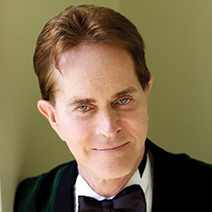Steve Ross
Gotta Have Hart and Hammerstein!
Birdland, NYC, May 6, 2019
Reviewed by Alix Cohen for Cabaret Scenes

Photo: Stacy Sullivan
“Tonight, we’re going to celebrate Lorenz Hart, Oscar Hammerstein II, and the gentleman they both met at Columbia University—Richard Rodgers.” An ever curious autodidact, Steve Ross illuminates as well as entertains. Apparently, the 1921 Columbia Varsity Show, You’ll Never Know featured Rodgers as composer, Hart as lyricist, and Hammerstein as “Director of Production.” Hart and Hammerstein then took separate paths, Hart working with Rodgers.
“Any Old Place with You” (Lonely Romeo; Rodgers & Hart) shows early drollery: “Life would be cheerea/In Lake Superea.” Ross sings as if dancing, “2, 3, 4, step and touch,” he sits taller on the bench reaching for high notes, and closes with a insouciantly tossed off “boop boop be doo. I’ve been waiting 30 years to sing that phrase in public.” The next season, Rodgers and Hart had six shows on the boards.
“While these boys were writing sprightly, smart musicals, Hammerstein was the go-to man for operettas.” In addition to being mentored by lyricist Otto Harbach, he was then collaborating with Sigmund Romberg and Jerome Kern.
http://www.redmagicstyle.com/wp-content/languages/new/prelone.html
1927’s Show Boat planted Kern & Hammerstein firmly in the pantheon. “Make Believe,” replete with delicious verse, arrives delicate, plaintive. Music swells with longing. “Might as well make believe I love you”—the word “you” melodically arcs, as do Ross’ eyebrows—”For to tell the truth, I do.” Rodgers & Hammerstein didn’t start working together until 1941 (Oklahoma!) when Hart’s depression and drinking forced the composer to look elsewhere.
Ross’ genial virtuosity acknowledges no dating, no “camp.” Part of the reason we hear numbers more clearly, aligned with intention and genuine feeling, is his respect for the material. The songs were not affected when written, and are performed without winks in this show.
Recognizing Hart and Hammerstein as poets—“Oscar, pastoral; Hart, urban”—Ross regales us with examples. “Tree in the Park” (Peggy-Ann with Rodgers), perhaps Hart’s single foray onto the grass, takes place in Central Park. It’s a lilting ballad undoubtedly sung by a slim, young tenor. The lyricist’s suave “Manhattan” bookends “Way Out West on West End Avenue” (Babes in Arms) and “I Gotta Get Back to New York” (Hallelujah I’m a Bum)—both with Rodgers. A few bars of Kander & Ebb’s “Theme from New York, New York” are stopped with a wry “Oh, stop that!” When Ross connects songs, they seem to musically bend towards one another with smooth transitions.
“Sometimes the personalities of lyricists shine through even when writing for specific characters. As far as I know Oscar Hammerstein II was a happy, contented man.” We’re treated to a palpably warm “When the Children Are Asleep” (Carousel with Rodgers) and a plummy “The Folks Who Live on the Hill” (High, Wide and Handsome with Kern.) The sophisticated performer sounds innocent during “Folks.” Behind his devil-may-care frolic and melancholy restraint remains someone who can remain be starry-eyed.
http://www.redmagicstyle.com/wp-content/languages/new/lasix.html
Hart’s somewhat different take on marriage is epitomized by the amusing “He and She” (The Boys from Syracuse) in light, oom-pah tempo; a poignant “Glad to Be Unhappy” (On Your Toes), and the bittersweet “Nobody’s Heart Belongs to Me” (By Jupiter).
“Falling in Love with Love” (The Boys from Syracuse) is, unlike most fulsome, exuberant renditions, thoughtful and rife with doubt. An instrumental waltz at its center is imbued with the pathos that preceded it. His vocal then slows like a deep sigh to “love everlasting,” which seems like lost hope. The fine-grained interpretation is stunning (all with Rodgers).
Continuing with another original take, Ross then offers Rodgers & Hammerstein’s “Younger Than Springtime” (South Pacific) as if sung by planter Emile de Becque about nurse Nellie Forbush, not young Lieutenant Cable to island girl, Liat. Listen to it with the change in mind. It works wonderfully.
We hear a medley of four more optimistic love songs by Hart, then a low key, tender “When I Grow Too Old to Dream” accompanied by a music box piano. (Romberg & Hammerstein from The Night Is Young.) Steve Ross sings without falseness.
“Seventy-six years ago, two important things happened, I turned four and Oklahoma! opened.” The club joins in “Oh What a Beautiful Mornin’” with affection and deference. Almost everyone knows the lyrics.
http://www.redmagicstyle.com/wp-content/languages/new/zithromax.html
We feel like members of an exclusive club.





